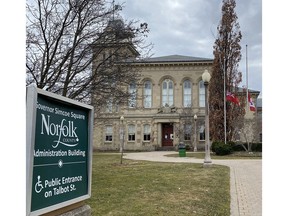
Norfolk ratepayers are facing significant increases on their property tax and water bills in 2025.
Advertisement 2
Article content
A report presented at a council-in-committee meeting on Tuesday pegs the preliminary net levy increase to 8.5 per cent, or about 7.5 per cent for the average taxpayer, when factoring in current projections for assessment growth.
At the same time, an average residential rate increase of 14 per cent is forecast for water and wastewater users in 2025 due to significant planned capital investments in those systems.
Norfolk Mayor Amy Martin called the projected net levy hike of 8.5 percent “pretty crazy,” even though it meets the numbers projected last year, and about 70 percent of the operating budget will just maintain, and not increase, current service levels.
The municipality’s operating budget covers day-to-day spending on services such as recreation programs, parks maintenance, public health, city roads, garbage collection, delivery of safe drinking water, and emergency services.
Advertisement 3
Article content
“I struggle with endorsing the 8.5,” said Martin. “What direction can be given to staff to go scrub the budget again and not just settle for what our projections were, thinking that’s a win? It’s still very expensive for the community members.”
Chris Everetts, manager of financial planning and reporting, said staff will work with whatever direction is given by council. He stressed the numbers are very preliminary and staff and the county’s senior leadership team will be “working very closely to mitigate increases where possible with a focus on affordability for taxpayers by trying to keep the increase below the projection.”
But these efforts will be hampered by a number of factors outside the municipality’s control, including general economic conditions, funding changes from higher levels of government, higher than normal inflation, negotiated salary increases for county staff, price adjustments for contracted services and high utility rates and fuel costs.
Advertisement 4
Article content
“Asset management and lack of properly funded reserves will also continue to be one of our largest drivers for 2025 and future years,” said Everetts.
Norfolk County is in a difficult financial position, with about $85 million outstanding debt, depleted reserves, aging assets, including roads, drinking water, wastewater and stormwater systems, and a multi-million-dollar funding shortfall to manage them. For the first time in its history, the county’s capital plan is projected to top the $1-billion mark.
Everett said about four per cent of the net levy increase is for infrastructure funding. Coun. Chris VanPaassen said the other 4.5 per cent is the inflation factor.
“What we need to purchase has gone up a lot more than the quoted rate of inflation,” said VanPaassen. “To balance that out, to end up at 4.5 per cent I think is reasonable.”
He said making cuts to services would keep tax rates from going up.
“We can eliminate the whole heritage and cultural division – get rid of all the museums all at once. That would save one per cent. We could eliminate the fire department and get rid of about five per cent. I don’t think the public would go for that.
“If you want business as usual, this is the budget that’s correct. If you’re willing to cut something, let’s look at that but I don’t see where you’re going to find it.”
Deliberations on the 2025 levy-supported operating budget are set for Jan. 15 and 16.
Article content